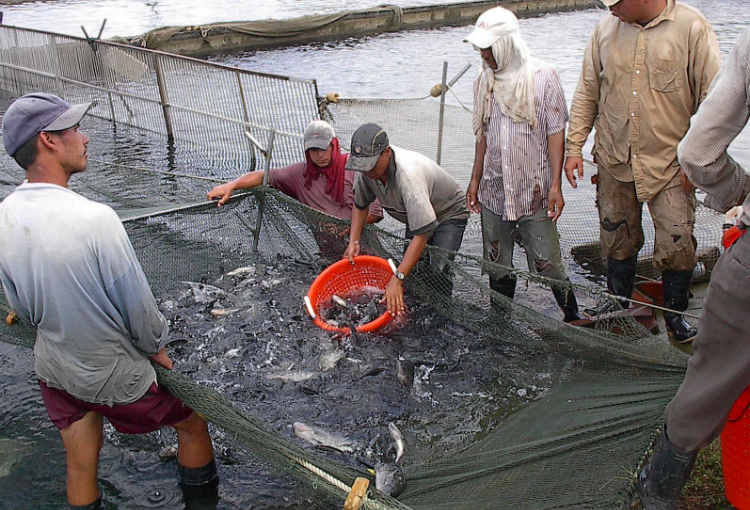Water — The Main Ingredient
At various points in my career, I have heard the argument that freshwater aquaculture makes more sen...

In many analyses of what the future holds for humanity, a certain question arises at some point in the discussion: Where will the additional food, especially the animal protein, come from? And how will we avoid widespread famine and suffering? In the context of climate change these questions take on even more significance.
This is a question that is often conveniently overlooked by those who make a living criticizing aquaculture. In some instances, hopefully, these criticisms are the result of sincere aspirations for a world that, unfortunately, is increasingly beyond our grasp. I prefer a more pragmatic approach when faced with the question. The Cambridge Dictionary defines the term pragmatist as “someone who deals with problems in a sensible way that suits the conditions that really exist, rather than following particular theories, ideas, or rules.” I will stick to my pragmatism regarding aquaculture until someone can demonstrate an alternative source of animal protein that can meet humanity’s requirements in the coming years.
I have been thinking about the common criticisms aimed at aquaculture and the fact that traditional terrestrial animal production is rarely confronted with similar disparagement. I can accept that very few forms of aquaculture are totally beyond any criticism whatsoever, but as a pragmatist I understand that there are always trade-offs. In the coming decades we can take advantage of the well-documented superior attributes of many aquaculture species in terms of sustainability and efficiency, or we can acquiesce and let others try to find solutions. To be honest, some of the criticisms I regularly encounter leave me scratching my head. Let me explain my confusion…
Criticism: aquaculture relies far too much on production of non-indigenous organisms. My response: Taurine cattle were domesticated in western Asia some 10,500 years ago and Zebu-based breeds originated in India sometime after that. Should global beef and dairy cattle be restricted to only those regions, and if so, how would that be done? Chickens were domesticated some 8,000 years ago in Southeast Asia. Why is no-one writing such harsh criticisms about non-indigenous chicken and egg production in places like Africa, Europe or the Americas? Pigs were first domesticated in Asia some 9,000 years ago, so should we halt all pork production in the rest of the world? Why aren’t any activists complaining about nonindigenous terrestrial animals? Where would the horse lovers weigh in on this issue?
Criticism: aquaculture often results in habitat loss or modification, as well as loss of ecosystem goods and services. My response: Hasn’t this been the case for terrestrial animal production for centuries, and even more so for agronomic crops? Why are poultry and livestock producers not continuously subjected to these same criticisms? I suspect it’s because the damage those industries may have caused was done so long ago that it’s taken for granted. This is not to say the concern has no validity when it comes to aquaculture development, but we are rarely on a level playing field.
Criticism: aquaculture results in the generation of effluents and other waste streams. My response: The superior protein and energy retention of many aquatic organisms generally puts aquaculture in a more sustainable position when compared to terrestrial livestock, yet criticisms along these lines are more widespread and exaggerated for aquaculture. Perhaps the critics should ponder their own waste streams, especially those that are not actually producing anything?
Impacts from aquaculture production are often mischaracterized in the media and online fora, with no mention of the underlying trade-offs. Difficult questions must be debated objectively, such as which would be preferable in terms of global seafood supplies: continued growth of aquaculture, or continued over-fishing, habitat destruction, wasteful by-catch, stock collapses and illegal fishing practices such as forced labor? Seems to me there’s a trade-off there. Perhaps another possibility that some critics would find acceptable would be to simply constrain aquaculture production through misguided policies and allow widespread malnutrition in lesser-developed nations reliant on fish as a source of animal protein?
In spite of those who bemoan this reality, access to animal protein is a necessity for most of the Earth’s population, and it will be for some time to come. Which raises another question: with our current and projected resources, including fresh water, arable land, and common feed ingredients, which would be preferable to meet humanity’s demand for animal protein? Continued growth of aquaculture or expanded poultry and livestock production? In most situations aquaculture has been shown to be a far more efficient use of these resources. And most climate-change scenarios suggest these resources will become more constrained in the coming decades, increasing costs and potentially reducing the availability of all but the most efficient feed-dependent animals, be they terrestrial or aquatic.
— C. Greg Lutz, Editor-in-Chief